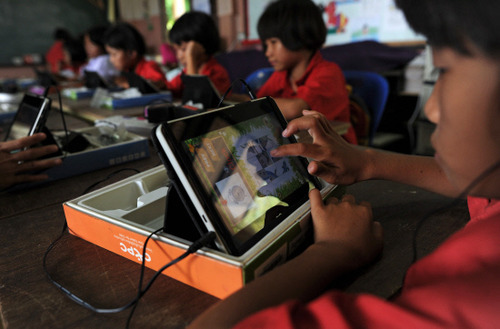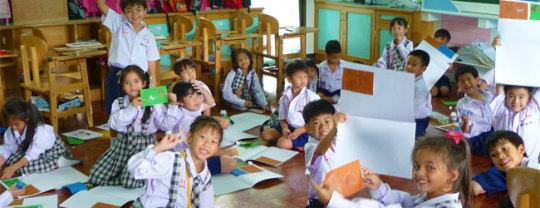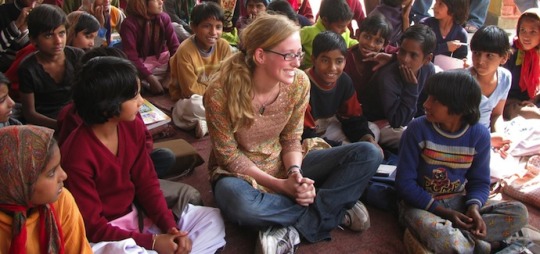Link
Live and work overseas teaching English in Europe, Asia, or Latin America. The CIEE Teach Abroad programs offer full support and training. No teaching experience necessary. English Teaching Overseas.
0 notes
Quote
“There can be infinite uses of the computer and of new age technology, but if teachers themselves are not able to bring it into the classroom and make it work, then it fails.”
Nancy Kassebaum
0 notes
Text
Baron's "From Pencils to Pixels": A Welcome Transition?
I have always been a strong proponent of reading paperback books. I like the feel of a book in my hands rather than staring blankly at words on a screen. It enhances the reading experience. But I have realized recently, as a result of Baron’s writing among many other things, is that reading books online has opened up so many opportunities for reading and learning. This is especially crucial to foreign nations in acquiring texts from different cultures. Students in Thailand don’t necessarily have access so an infinite resource of paper books. Actually, on average they don’t have much of a library at all. And they most certainly don’t have a wealth of texts from different cultures and places from around the world.
Books online could change this. With digital technologies implemented in Thai schools, so many doors could be opened. So many new opportunities reading and learning! As I have mentioned before, this is especially important in teaching English, as one might imagine. Having access to thousand upon thousands of online texts provides children more of a chance to experience and learn to love reading.
Baron also points out that with the creation of so many new digital text technologies, more people are writing than ever before. All sorts of mediums are being used and people all over the world are expressing themselves and sharing their ideas via these technologies. Such tools in the classroom would provide children wit infinite writing opportunities. The skill of writing is central to the English language, just as it is to any language. An effective medium for writing and creating is essential for teaching english, especially in a foreign country, such as Thailand.
As I have said in so many posts before and in this one too, it is clear how impactful these digital technologies could be to teaching english and to learning english. The digital age allows for so many new opportunities. Whether it be the actual act of teaching, learning, or just sharing the experience, digitality has revolutionized culture and cultural opportunities worldwide and it will continue to do so for a very long time.
#thailand#teachingenglishinthailand#technology#texttechnologies#learning#reading#writing#teaching#digitalage#culture#digitalculture
0 notes
Video
youtube
The video above is one of the things that truly inspired me to do work teaching English in Thailand after my schooling. Their are many videos much like it that provide insight as to what exactly one is to expect from the experience. There are also many videos promoting certain teaching programs and volunteering opportunities.
One of the points brought up on the Discussion Board regarding Green and Burgess's "How YouTube Matters" reading is how corporations utilize the media to promote themselves and consumerism. This is true but it is also unavoidabe. I think it is all the more important to recognize how YouTube is being used positively. Organizations that allow individuals to teach English abroad use media outlets like YouTube to share their mission statements, their goal, and their information and recruit people looking to make a change. These videos can be quite informative and inspirational much like the one above.
Without YouTube many people wouldn't know about many possibilities that lie in wait for them. It provides a medium for sharing important information in an incredibly accessible and comprehensive manner. That is so important for such a fast paced culture like ours. YouTube really does matter.
0 notes
Text
Grohol's "Psychology of Blogs (Weblogs): Everything Old is New Again": Not a Bad Thing!
Grohol has a section in his article entitled "Everything Unique is Something Old Repositioned". The way in which he speaks about this concept seems so negative to me. He seems to maybe even be disappointed in this realization. But I don't think that comes as a shock nor should should it be disappointing at all. Everything new comes from something old. Revolutionizing an old idea into a new one demonstrates just as much creativity as formulating a new idea altogether (if that is even possible). If this wasn't the case what would inspiration be?
The Internet is a beautiful thing in that it allows for individuals to be endlessly exposed to these old ideas and provides them with tools to create and outlets to share. It is the implementation of these tools with a unique mind that creates new things.
I feel that this concept is especially important when looking at education abroad. As I discussed in a few posts prior to this one, Internet access in these schools would lead to endless potential for inspiration that these children may not have access to otherwise. Additionally, digital media provides so many opportunities for creation and expression. These kids would have access to knew tools like Microsoft and Photoshop and video makes and so on. These things would not only allow for the expression of creativity, but they would also allow for fun and exciting lesson plans. Children can learn much more effectively (and actually enjoy learning) when they get the opportunity to be creative. With the tools that digital media allows, Thai children would has this chance at more effective learning!
0 notes
Text
Poster and Pop Culture
Within all this talk about all the amazing possibilities that implementing digital technology in Thai school could have, there would undoubtedly be risks. In a culture so unaccustomed to everyday life plagued by constant media connection, new exposure could be quite startling and strange. Also, there are many things that it would be a shame to see the young Thai children fall victim to on the Internet. We can clearly see how it has overtake our culture and in many aspects this isn't a good thing.
For instance, Poster talks about how pop culture crazed Americans are. Digital media has single handedly allowed for this. Every detail about every celebrity is at out fingertips. Social media sites allow for us to essentially lie side by side with the people that we so wrongfully idolize, knowing what they are doing at any given moment of any day. We worship this figures, iconizing people who so clearly don't deserve this.
For Thai children to be exposed to this would undoubtedly be a culture shock, as it should be. I think it is absolutely absurd that Americans do this. And, sure, we are not the only country that does this. But developing nations with little access to these social media outlets certainly do not. And this a good thing! Culture focused on pop culture is a tainted one. The culture in Thailand is so incredibly rich. Frivolous pop culture would distract and take away from that.
As an English teacher in Thailand, it would be so easy to bring with me my culture's obsession, especially when implementing digital media in the classroom. But I would avoid this at all costs. American op culture definitely has a stigma associated with it, and I would not want that to transfer over to my Thai students. It would definitely distract from learning and productivity and take from the beauty of the culture.
0 notes
Text
Jenkins's "Why Heather Can Write": Endless Opportunity for Inspiration

In "Why Heather Can Write", Jenkins discusses the opportunities that fans many novels have been given by the Internet. They now have an endlessly wide outlet for their creative inventions, inspired by famous works. Not only do they have constant access to an endless number of works, but they have forums for writing whatever responses they wish. This has led to young people all over the world creating alternate endings, different versions, and spin off of their favorite books. The opportunities for creativity are endless.
Reading this made me think about the opportunities that Thai children have for such creativity. The truth is quite disappointing. Bringing digital technology into the classroom would present so many young Thai children with so many new opportunites that they never would have otherwise had access to, so many new sources of inspiration.
This has even more chance of profoundly impacting the children in the area of English. If only they could be exposed to English literature and, they could learn the language in such a more productive manner. Not only would they be learning and practicing their English skills, but they would be appreciating works of art and being inspired.
In the US, nearly any child has access to a Harry Potter book. In Thailand, not so much the case. But it should be! They deserve the same opportunities to embrace and utilize language that any other child has. And who knows? Maybe they will begin formulating their own endings and spin off and so on. Digital technology in classes could lead to endless inspiration.
0 notes
Text
Miller and Shepard: A Grand Cultural Moment
In their online article Miller and Shepard analyze blogging as a genre. They assess the role that it plays in social action and the opportunity for a relative anonymity. However, this is not what I would like to discuss here. Miller and Shepard inspired me to look at the educational and technological development of Thailand in a whole different way, from the perspective of culture.
The words "cultural moment" truly stood out to me in the article. Miller and Shepard speak of the blog's existence in this day in age in a way that could be relatable to many present developments. This term "cultural moment" refers to absolutely anything's most pivotal moment within time and culture to shape the culture of that time and so on.
This immediately made me think of the implementation of technology in the educational systems in Thailand. I so strongly believe that it is Thailand's cultural moment right now. The country is growing technologically right now, as is the rest of the world. Digital technology is being used in the educational system to an extent, but perhaps now is the moment to radically increase this. As the developed world zooms ahead in technological development AND in education, Thailand's time has come. The time has come to better the country, to better the children, to better the culture.
Culture is such a tender thing. It is what sticks with a group of people for the duration of their ancestry, it is what defines them, it is what holds them together. Preserving that culture is key. By educating the youth, this culture can be better understood, and shared throughout the world. The future of the culture is in their hands and their ability to think and communicate could only benefit the culture. It would enable them to share their culture with the rest of the world. And they could do so through technology.
0 notes
Text
Grohol's "Psychology of Blogs (Weblogs): 2002": On Consistency and Novelty
"A new, shorter essay or commentary format is not fun to read if the writer isn't consistent or doesn't say something interesting (again, in a consistently engaging manner)."
I think that every person that has ever consistently followed a blog can agree with Grohol's above statement. In order for a blog to be successful, it must be updated often and well. The reader wants to come back consistently to find their favorite blog filled with new content written in the style and quality that they have come to know and to enjoy. They also expect to learn something new and exciting. A blogger could be posting every single day but if her content does not catch the reader's attention and maintain control of it, the consistency is irrelevant. A blog does not have these qualities is not likely to have a solid following.
As I stated in the last post, I think that a blog dedicated to sharing my teaching abroad endeavors would be incredibly productive and influential. It would be a wonderful thing to share with people. And I would assume that if I were to gain some sort of following, they would like to keep up with me, knowing my day by day adventures as they happen. Inconsistency would ruin the point, the feeling of vicarious adventure gone. This presents an exciting opportunity as well as an issue.
Firstly, writing and blogging every day of this sort of an adventure would be wonderful. It would be a chance to not only share the excitement of teaching english abroad but it would also be a means for digesting the experiences and immortalizing them with words. Creating this sort of blog (as discussed in the previous post) would be beneficial just as much to the audience as it would be to me, the blogger.
This idea of consistency does also present a challenge. In such a novel environment, I might not have the time or the opportunity to chronicle my experience every single day. Furthermore, living in a developing nation may mean that computers aren't accessible all of the time. If this were to be the case, creating and keeping up with a successful blog would be nearly impossible. So we can see that this may be a problem.
Nonetheless, I think a blog would be an incredible way to share the teaching abroad experience. The struggles are unavoidable but they are far outweighed by the benefits. The blogs listed in the previous post manage to remain consistent and exciting successfully, so could mine!
0 notes
Text
Hourihan's "What We're Doing When We Blog": An Opportunity to Share the Experience
"In general, 'blog' used to mean a personal online diary, typically concerned with boyfriend problems or techie news. But after September 11, a slew of new or refocused media junkie/political sites reshaped the entire Internet media landscape. Blog now refers to a Web journal that comments on the news -- often by criticizing the media and usually in rudely clever tones -- with links to stories that back up the commentary with evidence."
Many blogs presently exist in which young individuals chronicle the daily experience, trials, and triumphs involved in teaching abroad. A few recognized blogs of this nature are the following:
http://www.missadventuretravel.com
http://eslteacherinkorea.blogspot.com
http://www.teachingtraveling.com
http://discussenglish.blogspot.com
With the relatively new opportunities that personal blogs allow, these everyday individuals are able to inspire people all around the world with nothing but stories and keystrokes.
The quote above explains the evolution of blogs over time. The idea of personal blogs explained above creates a sort of stigma for bloggers. And the idea of news blogs seems to be on the opposite spectrum. Today, however, there are plenty of blogs that merge personal experience with current events and news around the world. Digital media lets people discuss these events in a first hand manor, touching on the news itself and how it effects them in their personal development, their everyday lives, and their surroundings.
As I am interested in pursuing a future in teaching abroad I think that this is endlessly interesting and useful. Teaching abroad is not solely about the teaching experience. It is about submerging oneself in a completely different culture and living life alongside natives. Chronicling this sort of adventure could open so many different peoples' eyes up to the experience, the culture, and current events. It would be a perfect opportunity to not only document and share my experience, but to inspire others to take on a similar endeavor!
0 notes
Text
Blood's weblog style: Should I be worried?
"While weblogs had always included a mix of links, commentary, and personal notes, in the post-Blogger explosion increasing numbers of weblogs eschewed this focus on the web-at-large in favor of a sort of short-form journal." Here, Blood explains how, at their inception in 1999, blogs took on an entirely different format. Bloggers then didn't have the same freedom that bloggers have today. In the spirit of this, I'm going to analyze an article that I find quite troubling regarding teaching in Thailand in this manner.
http://voices.yahoo.com/problems-likely-encounter-teaching-english-3839684.html?cat=16
In this article, yahoo contributor Cassandra James provides for the reader an extensive list of things to be wary of when looking to teach in Thailand . Chances are the reader of this article, myself included, is a young college student or graduate, excited to be considering the possibility of taking on such an adventure. Bright eyed and bushy tailed, I searched the Internet for articles related to "teaching english in Thailand". To my dismay, I stumbled upon Ms. James.
I have several problems with Ms. James and her supposedly helpful article, the first of which being that it is not helpful at all. It seems like James wrote her article with the intention to frighten the reader. SHe does not speak of any redeeming qualities related to teaching in Thailand, but rather speaks of her personal struggles in a universal and unavoidable manner. The title of the article itself is unsettling: "Problems You Are Likely to Encounter Teaching English in Thailand". And then the subtitle follows starting with the words "be warned". James speaks of teaching in Thailand as if it were the most unrewarding experience of her life, as if it was not worth it at al. Essentially she is trying to dissuade the reader from taking on this endeavor.
Secondly, James doesn't seem to appreciate or value the different culture in which she is submerged, nor does she seem to value the experience itself. Of course teaching English in a foreign country is not the most lucrative profession to get into. Was she expecting to become some sort of American royalty in Thailand? That is ridiculous. I don't see why she expected the job to provide her with any more that it would the people living in Thailand. You teach abroad for the experience and in order to make a difference, not for a hefty salary. I think James needs to reevaluate her priorities.
James also fails to recognize the beauty of the very different culture. Many of the problems that she explains are products of culture shock. This is to be expected. She never quite takes time to acknowledge this, to tell the reader that while it was a struggle, becoming immersed in the culture was a beautiful experience. She doesn't think it's beautiful, she thinks it's a hassle. This article introduces me to Cassandra as entirely unappreciative and close minded.
One of the biggest problems I have with Ms. James and her article is the disconnect between the way she reports the nature of things and the nature of the problems in Thailand and the experience that she is actually having. She tells of how little people makes, yet omits herself as an exception, someone who happens to make much more. She explains how one could not live on such a salary, and yet she has never had to or tried to do it herself. Thus, her arguments don't seem very grounded. SHe doesn't seem like the person that someone interested in taking on this experience should go to for advice.
I've looked at several other articles regarding this topic and have found much for encouraging content, namely the article below.
http://www.gooverseas.com/blog/teaching-english-in-thailand-tips
This article provides helpful tips. Rather than warning the reader about the problems that Ms. James demonizes, this article explains in a helpful manner just how to encounter obstacles. In no way, shape, or form does this article serve to dishearten you or scare you away from this opportunity of a lifetime. This article is far more helpful and far more encouraging. It goes to show how easily one dissatisfied ( should I so far to say spoiled?) person and have such an impact on others decisions. I certainly know that I felt completely downtrodden and worried reading James's article for the first time. But then I explored further. I realized that she was a needle in the hay stack, and definitely not one that I wanted or needed to find.
0 notes
Text
Johnson's Bitmapping: A look at the evolution of interface in Thai Classrooms

If you close your eyes and envision Thailand, you probably picture a developing country where digital technology is most definitely not a staple for the people. Now, however, new interfaces are steadily making their way to Thailand and dispersing throughout the country. The people are being given new opportunities to learn and to utilize this instrument that we take for granted in the United States. I know that I have certainly never pictured the students that I plan on teaching as having the chance to implement digital technology into their curriculum and their school work. But like throughout the country, these new interfaces are beginning to find their place in the classroom.
As Johnson points out, the past and present in technological development cannot be separated; they are intertwined and the latter is constantly building off of the former. This is undoubtedly happening in developing nations such as Thailand, just in a different way and at a different pace. In the average American classroom, children have cell phones, laptops, tablets. Now, tablets and laptops are making their way into classrooms like the one depicted above. The main difference, however, is that they are not yet a staple. Children in the United States can't comprehend living without this technology, without these advanced interfaces; children in Thailand must begin to learn how to live with them, how to manipulate them, and how to take advantage of them.
Thus, the teaching of technology becomes part of the teaching process. When these tools are made accessible (which is a growing trend) teachers must intertwine the teaching of material and the teaching of technology. This puts a whole new spin on the concept of teaching English.
0 notes
Photo
One day soon.

Adventures abound on this beautiful Sunday in Chiang Mai.
4 notes
·
View notes






